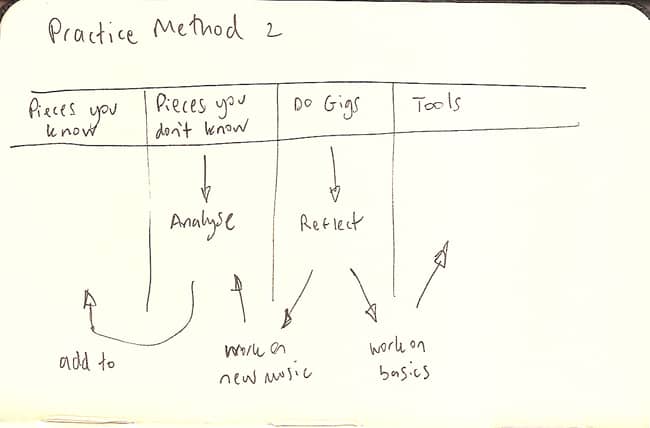This is an expansion on the Basic Practice Method which, to remind you, was:
- Do Gigs
- Learn Pieces
It all starts with Doing Music
The music will tell you what you need to work on.
When you ask, ‘How do I know what to practise?’, the answer will come from reflecting on the music you play.
Let’s say you play and you hear a band-mate doing some interesting rhythmic stuff. You’d like to do that, maybe.
At this point, I’d try to address any issues like that by learning some more music. For instance – learn some rhythmic music, or ask the band-mate what they’re doing, who they’ve listened to, and so on. My point is that, by playing, the music will tell you what you should be doing. And it’ll be based on your love of music. Not your idea of what you ought to be doing. One way will sustain you; the other will maim you ;)
Start with what you love.
- What do you love?
- What do you want to learn?
As you learn it, analyse the bejesus out of it.
Find out how it’s pieced together, learn the history, the notes, the rhythm, the form, the harmony, motifs, fingerings, phrasing choices, techniques, etc.
When you can play it, then you can add it to the list of things you know.
I’d suggest then playing it every day as a warm-up. That’d be nice, wouldn’t it? Starting a practice session by playing a few pieces that you’re really into.
By playing it every day for a while you’ll get to really know it.
Some things can’t be addressed by learning a new piece. Things like knowing the notes on the fretboard, or knowing what notes are in the Db major scale, and so on. The gig will let you know that you need to learn that stuff, too. This is material: scales, arpeggios, chords, keys, ear-training, sight-reading, and so on. All the stuff that isn’t a piece of music.
So that’s sort of it. I could expand on each of these areas in great detail but I prefer it simple and it’s already way too complex for my liking.
One thing: this is my best attempt to answer the question, ‘how do you do a practice routine?’, but I don’t really have a practice routine at all. I just really love playing and finding out about music, so everything just takes care of itself. I find when I try to organise myself, or try to set goals, I get bored, so I prefer just to amble along, go with the flow, see what happens…
What works for you?

Thanks Mike :)
It’s what’s right for you, and you only know that by the situation you’re in. The music will tell you what you need to work on. If you’re playing standards all day, then you’ll need to work on that. So what’s right for you, me, Jan, Evan, is right for them because of the music they play. Music first.
College is where you get to explore all of that. I’m envious of that! Take time, explore it all, find out what’s right by playing A LOT :)
You will be surprised by people though, so keep an open mind! It wouldn’t surprise me one bit if Evan was tearing it up on 26-2 :)
Your right. Jan Garbarek was playing free avant garde long before he mastered changes. Apparently Evan Parker still sits out on standards.
I’ll be starting at Leeds College of Music in September!
Go with what you love. Deal with the rest when you need to.
Where are you going to Uni?
Hello Mike,
I OUGHT to be learning straight ahead swing/bop improvising as this is what I’ll be playing in my first year at uni. But would LOVE to just go ahead and transcribe some stuff from Miles’ Nefertiti album.
Hi James,
Can you clarify what you mean? What is the focus for you?
What if it’s free jazz that you love but you still struggle with bebop?
Thanks, Dylan. Hope it works for you!
Mike, this is fantastic. Thanks so much for sharing. I remember Tim Miller saying very similar things to me, yet I’ve still tended to be a “lists”-type practiser. Time to change over to your method I think… Thanks for the inspiration!